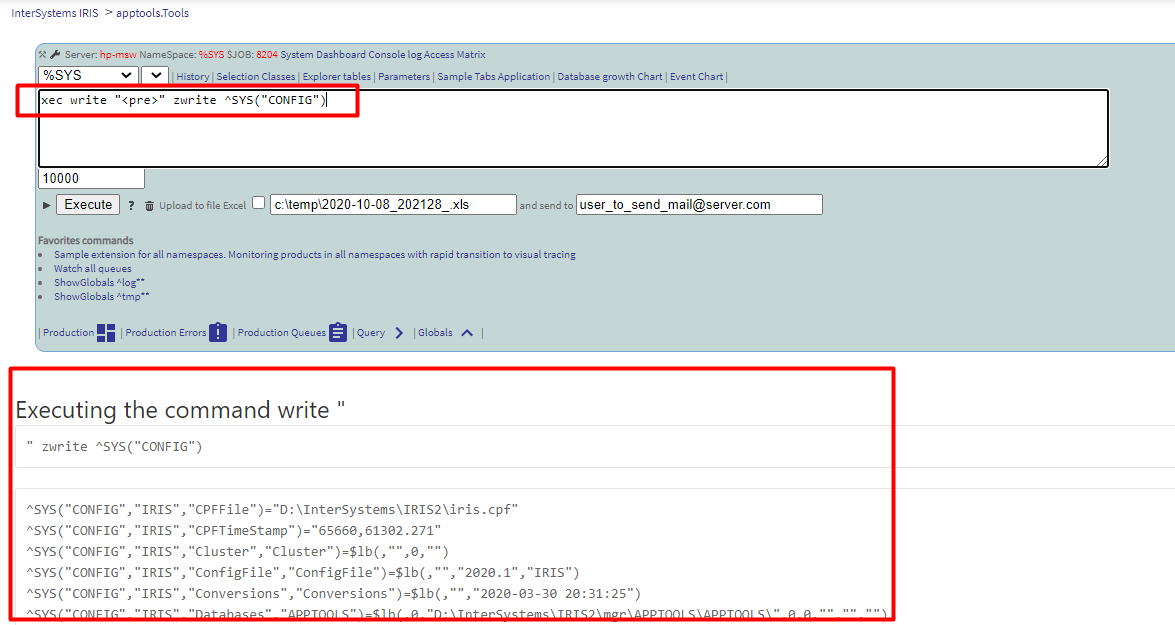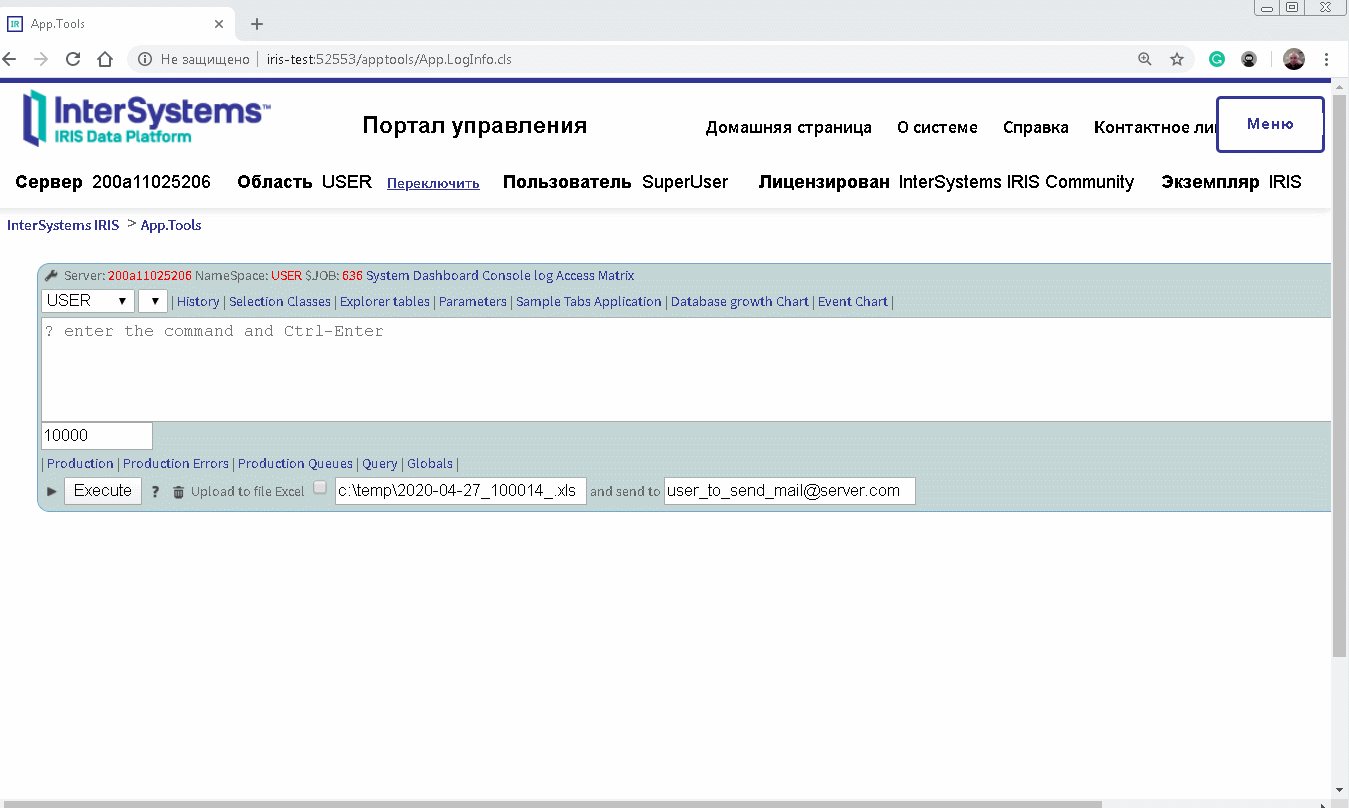A platform for creating applications for administration and tools for technical support and a database administrator.
Viewing and editing global arrays, executing queries, including JDBC / ODBC, generating results in XLS, XLSX, JSON formats, sending results by e-mail in the form of XLS files. Execution of queries and IRIS commands in the interface for any namespace. Summary analysis and error viewing for all namespaces.
Enabled support for Django projects via the native Python API library.
Added fileserver module for report execution results. Implemented file deletion mode in the fileserver module. Formation of results in XLS, XLSX formats has been implemented. In the interface, the mode of exporting globals in the JSON format has been added
-
Module for exporting IRIS requests to excel file using python openpyxl library.
-
Informing support projects using telegram messenger bots. Notification via telegram
-
Web application photo album, music player and personal e-book library.
-
Application of products forming a database of exchange rates of the Central Bank of the Russian Federation.
-
An example of a backup task with preliminary deletion of old files.
-
User interface for selecting IRIS resources and creating a zpm package. UI for basic commands from module generation, loading, installation, uninstallation to publishing to the registry.
If the current ZPM instance is not installed, then in one line you can install the latest version of ZPM even with a proxy.
s r=##class(%Net.HttpRequest).%New(),proxy=$System.Util.GetEnviron("https_proxy") Do ##class(%Net.URLParser).Parse(proxy,.pr) s:$G(pr("host"))'="" r.ProxyHTTPS=1,r.ProxyTunnel=1,r.ProxyPort=pr("port"),r.ProxyServer=pr("host") s:$G(pr("username"))'=""&&($G(pr("password"))'="") r.ProxyAuthorization="Basic "_$system.Encryption.Base64Encode(pr("username")_":"_pr("password")) set r.Server="pm.community.intersystems.com",r.SSLConfiguration="ISC.FeatureTracker.SSL.Config" d r.Get("/packages/zpm/latest/installer"),$system.OBJ.LoadStream(r.HttpResponse.Data,"c")
If ZPM is installed, then ZAPM can be set with the command
zpm:USER>install apptools-admin
Make sure you have git and Docker desktop installed.
Clone/git pull the repo into any local directory
$ git clone https://github.com/SergeyMi37/apptools-admin.git
Open the terminal in this directory and run:
$ docker-compose build
- Run the IRIS container with your project:
$ docker-compose up -d
Open IRIS terminal:
$ docker-compose exec iris iris session iris
USER>
USER>zpm
zpm:USER>install apptools-admin
Load http://your-host:your-port/apptools/apptools.core.LogInfo.cls?WHAT=%3F
-
view the list of globals by mask with count blocks occupied by them.
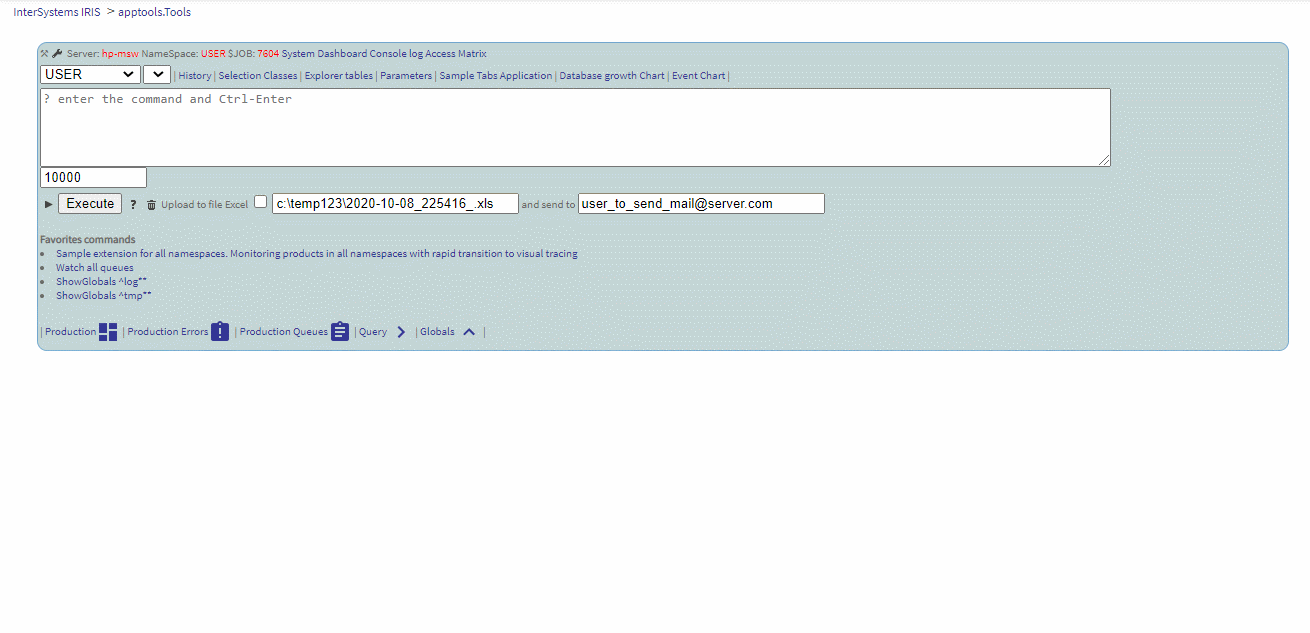
-
viewing global and direct and reverse with a possible filter by links and node data. Edit global nodes. Export a selection of nodes and global data to an XLS file and send the archive to an email.
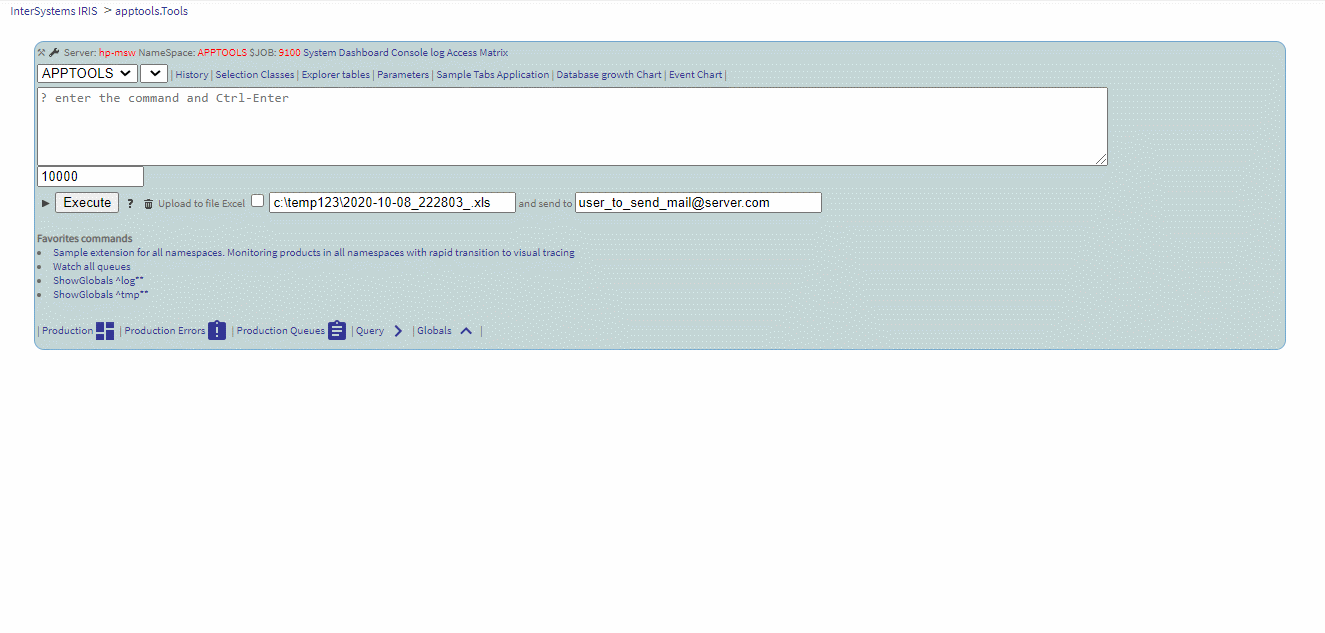
-
execution of queries and SQL statements with the ability to connect via JDBC / ODBC. Export the results to an XLS file and send the archive to an email.
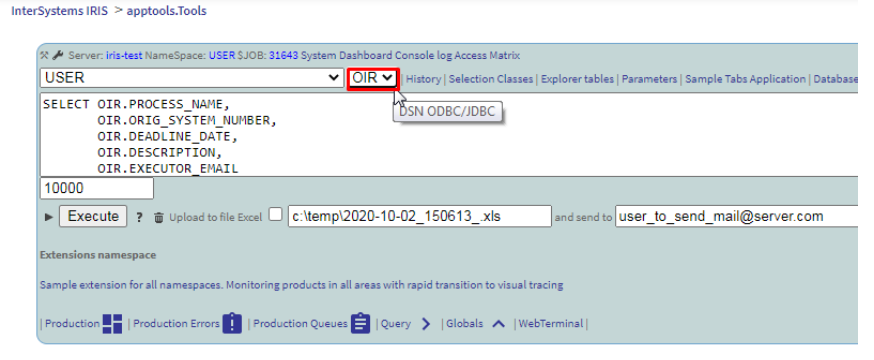
-
saving commands and queries in the program history with the ability to run them again.
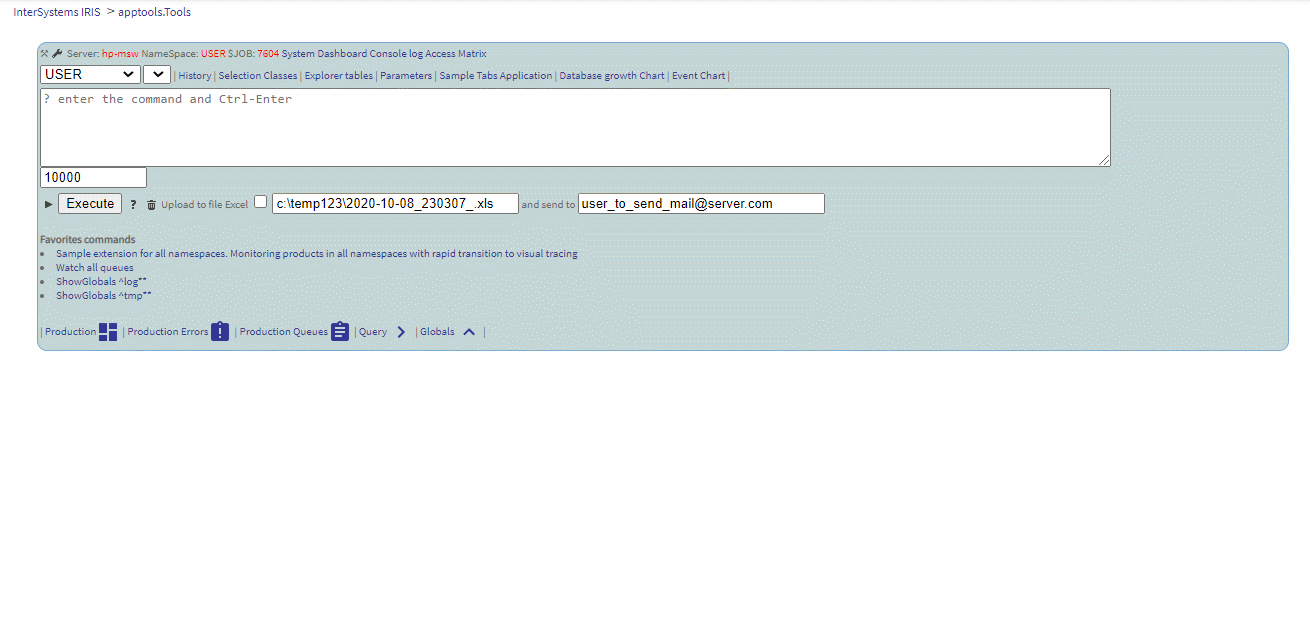
-
All executed commands are remembered in history for the opportunity to repeat again. Frequently executed commands can be saved as favorites.
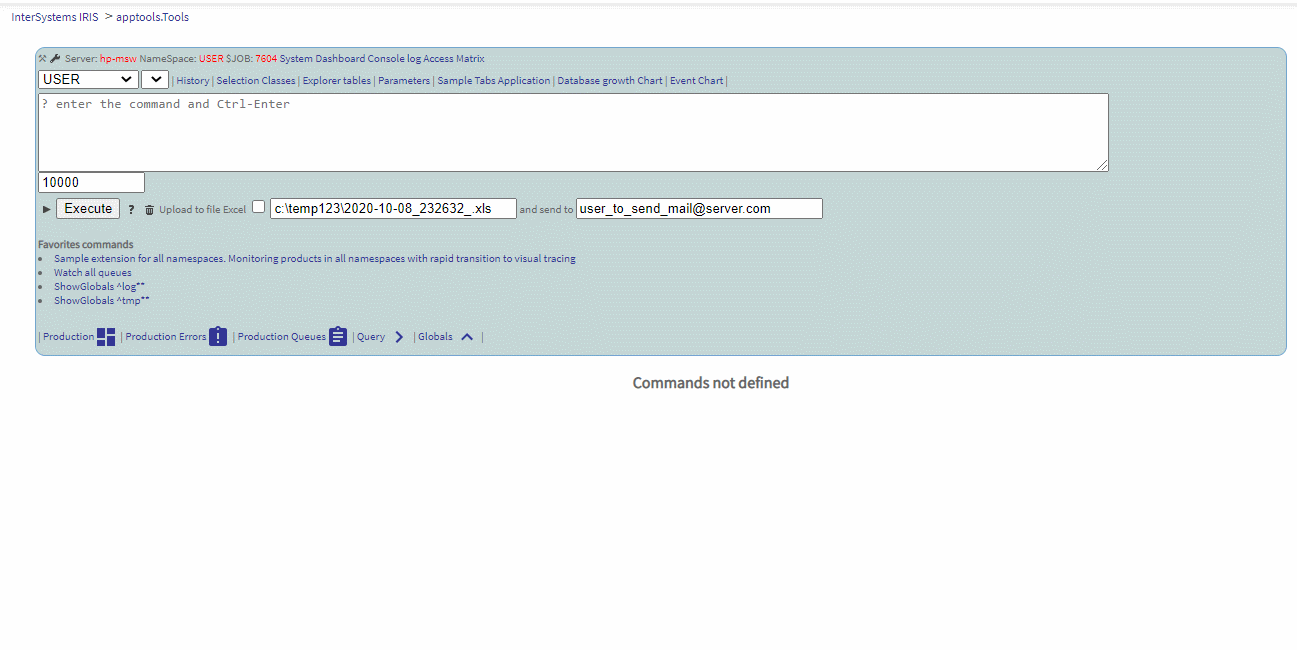
In this solution, I use REST-API adapted from the Webterminal and metrics ^mgstat
Load http://your-host:your-port/apptools/apptools.Form.Exp.cls?panel=AccordionExp
- Navigation by namespaces, class, and class instance. Create, edit, and delete class instances in the on-screen form interface.
Load http://your-host:your-port/apptools/apptools.Tabs.PanelUikitPermissMatrx.cls?autoload=Matrix
Load http://your-host:your-port/apptools/apptools/apptools.Tabs.PanelSample.cls
Load http://your-host:your-port/apptools/apptools.Tabs.TabsPanelUikit.cls
Load http://your-host:your-port/apptools/apptools.Chart.Chart.cls?panel=class(apptools.Chart.ChartPanel).ChartAlert - output of the DBMS events using the iris.log protocol (cconsole.log)
Load http://your-host:your-port/apptools/apptools.Chart.Chart.cls?panel=class(apptools.Chart.ChartPanel).ChartAlert - output of the growth dynamics of DBMS database files using the messages.log protocol (cconsole.log)
IRISAPP>do ##class(apptools.core.sys).SaveQuery("%SYSTEM.License:Counts", "^test",123)
IRISAPP>zw ^test
^test("%SYSTEM.License:Counts",123,0,1)="InstanceLicenseUse"
^test("%SYSTEM.License:Counts",123,0,2)="License Units"
^test("%SYSTEM.License:Counts",123,1,1)="Total Authorized LU"
^test("%SYSTEM.License:Counts",123,1,2)=5
...
IRISAPP>zn "%sys"
%SYS>do ##class(apptools.core.sys).SaveQuery("SYS.Database:FreeSpace")
%SYS>zw ^%App.Task
^%apptools.Task("SYS.Database:FreeSpace","2020-03-22 09:36:49",0,1)="DatabaseName"
^%apptools.Task("SYS.Database:FreeSpace","2020-03-22 09:36:49",0,2)="Directory"
^%apptools.Task("SYS.Database:FreeSpace","2020-03-22 09:36:49",0,3)="MaxSize"
^%apptools.Task("SYS.Database:FreeSpace","2020-03-22 09:36:49",0,4)="Size"
^%apptools.Task("SYS.Database:FreeSpace","2020-03-22 09:36:49",0,5)="ExpansionSize"
...
%SYS>do ##class(apptools.core.sys).SaveSQL("select NameLowerCase,Description,Name FROM Security.Roles where Name['DB'", "^logMSW2")
%SYS>zw ^logMSW2
^logMSW2(-3,"sql")=$lb("select NameLowerCase,Description,Name FROM Security.Roles where Name'DB'")
^logMSW2(-3,"timestamp")=$lb("2020-03-22 09:49:50","2020-03-22 09:49:50",0)
^logMSW2(-1,"Description")=2
^logMSW2(-1,"Name")=3
^logMSW2(-1,"NameLowerCase")=1
^logMSW2(0)=$lb("NameLowerCase","Description","Name")
^logMSW2(1)=$lb("%all","Роль Суперпользователя","%All")
^logMSW2(2)=$lb("%db_%default","Доступ на чтение/запись для ресурса","%DB_%DEFAULT")
...
If you determine JDBC-DSN, then you can connect to an external database
// do ##class(apptools.core.sys).SqlToDSN("SELECT * FROM xxmv.xx_t359_pzn","JDBC-DSN","^tmpMSWq"))
Function to call from a regular tasks
%SYS>do ##class(apptools.core.sys).RunCmd("sudo du -sm /usr/irissys/mgr/*| sort -nr",$na(^%App.Cmd("mgr",$zd($h,3))),1,"/tmp/")
%SYS>zw ^%App.Cmd
^%App.Cmd("mgr","2020-03-22","2020-03-22_17:27:03",1)="388"_$c(9)_"/usr/irissys/mgr/irislib"
^%App.Cmd("mgr","2020-03-22","2020-03-22_17:27:03",2)="176"_$c(9)_"/usr/irissys/mgr/enslib"
^%App.Cmd("mgr","2020-03-22","2020-03-22_17:27:03",3)="100"_$c(9)_"/usr/irissys/mgr/IRIS.WIJ"
^%App.Cmd("mgr","2020-03-22","2020-03-22_17:27:03",4)="97"_$c(9)_"/usr/irissys/mgr/journal"
^%App.Cmd("mgr","2020-03-22","2020-03-22_17:27:03",5)="90"_$c(9)_"/usr/irissys/mgr/IRIS.DAT"
...
// do ##class(apptools.core.sys).RunTask("snmpwalk -v 1 server.ru -c public 1.3.6.1.4.1.16563.1.1.1.1.10","^%App.TaskLic","%SYSTEM.License:Counts","/tmp/")
%SYS>do ##class(apptools.core.files).OneDayJournalCount("/usr/irissys/mgr/journal/"_$tr($zd($h,3),"-"),"^tmpJRN")
/usr/irissys/mgr/journal/20200322.001
Processed /usr/irissys/mgr/journal/20200322.001% 2 written in ^tmpJRN
/usr/irissys/mgr/journal/20200322.002
Processed /usr/irissys/mgr/journal/20200322.002% 2 written in ^tmpJRN
/usr/irissys/mgr/journal/20200322.003
%SYS>zw ^tmpJRN
^tmpJRN=""
^tmpJRN("IRIS",20200322,16,"/opt/irisapp/data/","KILL","^ROUTINE","Counts")=1
^tmpJRN("IRIS",20200322,16,"/opt/irisapp/data/","KILL","^ROUTINE","NewValue")=0
^tmpJRN("IRIS",20200322,16,"/opt/irisapp/data/","KILL","^ROUTINE","OldValue")=0
Export to report CSV file
%SYS>do ##class(apptools.core.files).Export2CSV("/tmp/JrnCount*.csv","^tmpJRN")
Written to the file /tmp/JrnCount20200322173446.csv
The module for converting query results to a xlsx file based on the python openpyxl library is included.
zn "user"
USER>do ##class(apptools.python.xlsx).sql2xlsx("select * from apptools_core.Log order by id desc","n,,,,,n,,,,d","/tmp/sample-py.xlsx")
Initialize interoperability and create a new test product (thanks Dias) in IRISAPP.
IRISAPP>do ##class(apptools.core.Production).CreateProduction("IRISAPP", "Test.TestProd", "Ens.MonitorService,Ens.Alerting.AlertManager,Ens.Activity.Operation.REST")
IRISAPP>do ##class(Ens.Director).StartProduction("Test.TestProd")
Initialize interoperability and create a new test product in USER.
zn "user"
USER>do ##class(apptools.core.Production).CreateProduction("USER", "Test.TestProd2", "Ens.MonitorService,Ens.Alerting.AlertManager,Ens.Activity.Operation.REST")
IRISAPP>do ##class(Ens.Director).StartProduction("Test.TestProd2")
When you administer more than 2 products, the scheduled server restart turns into a monotonous routine operation of manually stopping each product. To automate this, a set of utilities is used.
Preserve statuse and stop products in all namespace.
IRISAPP>do ##class(apptools.core.Production).SaveAndStop()
All products are stopped, you can restart the server. After starting the DBMS, you can start all the products that were launched before.
IRISAPP>do ##class(apptools.core.Production).StartAll()
Get a class description, optionally with a superclass
IRISAPP>do ##class(apptools.core.LogInfoPane).GetClassDef("Test.TestProd2","",.def,1)
IRISAPP>zw def
def("ClassName","Ens.Production")=""
def("ClassName","Ens.Production","super") = "%RegisteredObject,Ens.Settings"
def("ClassName","Ens.Settings")=""
def("ClassName","Test.TestProd2") = ""
def("ClassName","Test.TestProd2","super") = "Ens.Production"
def("Methods","ApplySettings","Description") = "Apply multiple settings to a"
...
Create html format documentation in the form of tables for all products, including BS. BP BO and all classes that they meet
IRISAPP>do ##class(apptools.core.Production).GenDoc("/usr/irissys/csp/user/gen-doc.html")
All other features of the interface part of the software solution can be found in the document or in an article of a Russian resource













